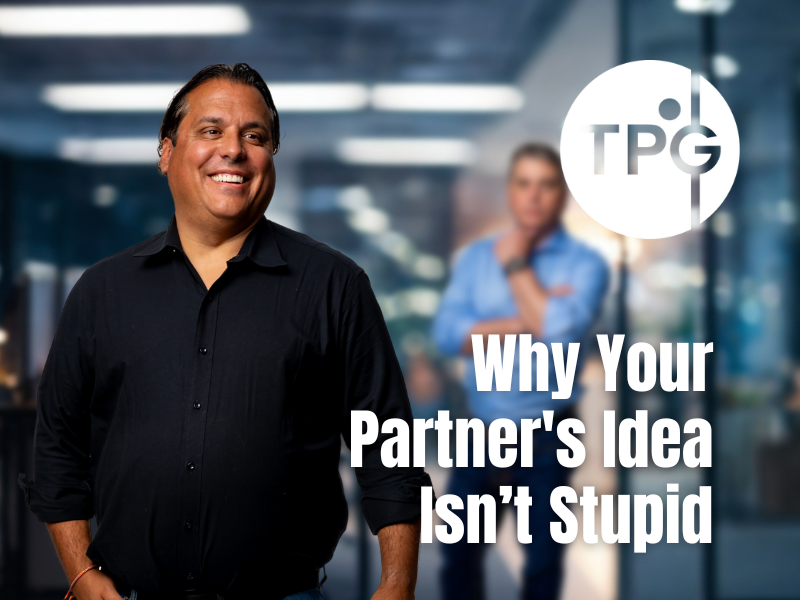Why Your Partner's Idea Isn’t Stupid (Even If It Sounds Like It)
By Todd Leonardis
We’ve all been there. Your business partner leans in with a glint in their eye and says, “I have this idea…” And before they even finish, your inner monologue is screaming, “This is insane.” You’re already mentally calculating the cost of cleaning up the fallout.
But here’s the truth: most great ideas sound crazy at first.
Go ahead—think about some of the biggest business wins in history. A guy thought people would pay to sleep in a stranger’s house (Airbnb). Another thought we’d be cool with getting into a stranger’s car for a ride (Uber). Every one of those started as a “crazy” idea. And they became game changers not because someone shut them down—but because someone listened.
The Problem With "That’s a Dumb Idea"
Let’s be honest. Calling an idea “stupid” is easy. It’s a defense mechanism—a way to protect time, money, and your version of logic. But it kills creativity. Worse, it damages trust. When you’re in a business partnership, shutting down your partner’s ideas too quickly doesn’t just stop innovation; it stops communication.
And that’s where the danger really lies. If your partner doesn’t feel safe sharing their off-the-wall ideas with you, they’ll stop sharing altogether. You won’t just miss out on the crazy ones—you’ll start missing out on the great ones too.
Start Ugly and Fail Fast
The most powerful shift in our partnership came when we decided that no idea was off-limits. That doesn’t mean we execute every thought that pops into someone’s head—but we do explore it. We created this process for entertaining wild ideas without turning the company upside down: start ugly and fail fast.
Start ugly and fail fast is business code for stop polishing that idea like it’s a Ferrari and get moving. You get it out there fast, take the hits, learn what works (or doesn’t), and tweak it before you waste six months and your entire budget making something no one wanted in the first place. It’s not about being reckless—it’s about being smart enough to know that the first version is supposed to suck.
This mindset lets us try things early, often, and without a giant price tag. It means we can test crazy ideas quickly and keep moving. The goal isn’t perfection—it’s progress. And when we trust each other, even a half-baked idea can turn into something remarkable.
Think this is just a scrappy small business trick? Think again.
Some of the most successful companies in the world thrive on crazy ideas—because they’ve mastered the art of testing them without risking the whole operation. McDonald’s, for example, has turned limited market testing into a science. The McRib, smoothies, McCafe drinks, even all-day breakfast—none of those were national rollouts at first. They were quietly introduced in select markets to test demand, customer feedback, and operational feasibility.
Target follows a similar playbook, launching new products, store layouts, and private-label brands in a handful of stores before committing to national distribution. These trial runs help them minimize risk while spotting hidden potential.
Apple and Samsung regularly test unreleased tech internally or through employee beta programs long before they hit the consumer market. Even features like Face ID or foldable screens were considered borderline sci-fi until they were fine-tuned behind the scenes.
Parking or Shutting Down Ideas
We’re not saying you should greenlight every unicorn-and-rainbow idea that comes your way.
Sometimes your partner’s brainstorm is less “next big thing” and more “next big lawsuit.” When that happens, the goal isn’t to crush their spirit with a hard “no,” but to redirect with some grace. A simple, “I love the creativity, but let’s talk about how this actually fits into what we’re doing,” can go a long way. You’re not killing the idea—you’re parking it in the “maybe later” lot or steering it toward something more doable. Respect the spark. Then gently hand them a fire extinguisher.
The goal is to give your partner permission and encouragement to think differently. That permission—rooted in trust and communication—is the real fuel for innovation. The more you build that foundation, the more capable you both become at recognizing opportunity where others see risk. When your partner feels heard (even when the idea is rough), you get access to their full creative potential—and that can lead to exponential returns.
Ready to Change the Way Your Partnership Works?
The next time your partner comes to you with a “crazy” idea, stop yourself before you roll your eyes. Take a breath. Get curious. Ask questions. Run a test. If it fails, great—you learned something. If it flies, you just found your next big win.
At The Partnership Guys, we help business partners build the kind of trust and communication that makes real innovation possible. Let’s work together to create a partnership where no idea gets shut down too soon—and where bold thinking leads to big wins.
Reach out to us today and let’s talk about what’s possible when your partnership is firing on all cylinders.

